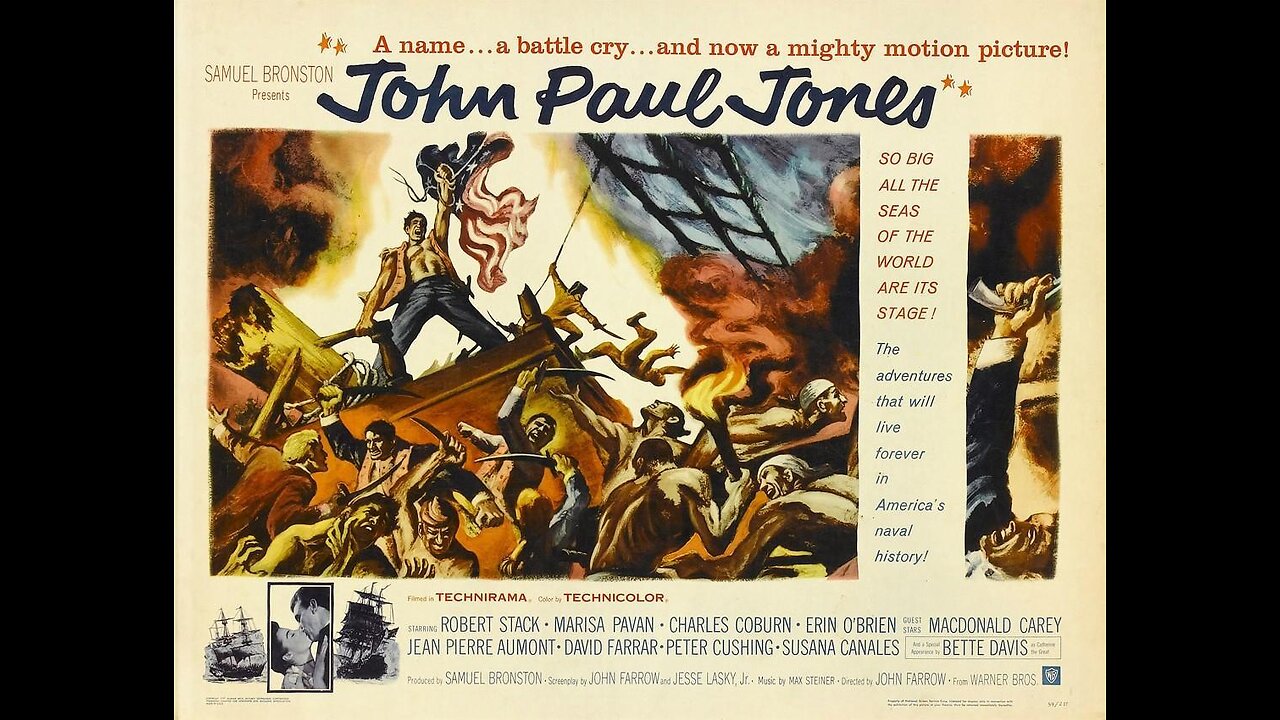Premium Only Content

JOHN PAUL JONES (1959)
The career of Revolutionary War naval hero from his youth in Scotland through his service to Catherine the Great of Russia. The On screen narration opens with a United States Navy officer telling new midshipmen at the U.S. Naval Academy the story of John Paul Jones (played as an adult by Robert Stack).
In 1759, twelve-year old John Paul (John Charles Farrow) attacks an English officer trying to enforce English laws against bagpipe playing and wearing kilts, symbols of Scottish nationalism. John Paul becomes an apprentice, serving on several ships, becoming an experienced navigator by age 17 and by 1773 becoming master of a ship in the British West Indies. A fight with a mutinous crew member results in the mutineer's death, but because of the sailor's family connections, the governor of Tobago (Basil Sydney) advises Paul to leave and change his name. Paul adds a new surname, becoming "John Paul Jones," and goes to visit a brother who lives in Fredericksburg, Virginia.
Jones' brother has recently died, and he learns that he is to inherit his brother's estate, which includes two enslaved children, named Scipio (Charles Wise) and Cato (Randolph McKenzie), who are about to sold in the slave market. Jones, who in an earlier scene had expressed his hatred of the slave trade, frees the boys, who continue to work with him alongside his late brother's clerk, Peter Wooley (Tom Brannum). Jones also retains the services of his brother's attorney, the rising politician Patrick Henry (Macdonald Carey), to assist in business matters. Jones and Henry share resentment of British rule in the American colonies, but Jones finds himself torn between their friendship and his interest in Henry's love interest, Dorothea Danders.
His brother's will had required Jones to settle down as a farmer, which Jones tries to do with little success. Having been rejected by Dorothea's father as a possible husband because of his questionable past, he decides to return to sea. The American Revolution has begun, and Jones shows his daring and ingenuity in a surprise American attack on British forces in Nassau in the Bahamas despite his superiors' misgivings. With the Declaration of Independence, Jones is given his own command in a barely-existent American Continental Navy and is reunited with Scipio and Cato, who then sail with him. Jones is able to seize eighteen enemy ships, whose cargo includes clothing meant for British troops under General Burgoyne but is now sent to American General George Washington.
Despite his successes, Jones is denied further command due to his low social and political status. When Jones goes to Valley Forge to deliver his resignation, Washington points out the desperate circumstances of his troops and persuades the sailor to go to France to help Benjamin Franklin in enlisting the French as allies. In France, Jones is celebrated for his heroic feats at sea. At Franklin's urging, Jones takes a Dutch frigate that had been captured by the French and conducts a series of raids on the British coast, capturing the town of Whitehaven and its arms but treating the townspeople well. Once again, however, Jones' success is undercut by political rivalry, and his ship is taken from him.
Jones' new love interest, Aimee de Telleson, is a lady in waiting to Marie Antoinette and, with Franklin's help, they persuade King Louis XVI (Jean-Pierre Aumont) to build a new ship for Jones, which will fly under the American flag with the name Bonhomme Richard (the French name for Franklin's "Poor Richard"). At sea, Jones engages in battle with the British ship HMS Serapis. Though his ship is heavily damaged, Jones continues to fight on, telling British Captain Richard Pearson, "I have not yet begun to fight!" Jones and his men overpower the British and seize control of the Serapis even while his own ship sinks.
Jones is unable to pursue his romance with Aimee because, again, of his social status. With the end of the revolution, Jones' desire to be put in command of the American Navy is also thwarted by the lack of government funding, so he answers the call for his help from the Russian Empress Catherine the Great.
Surrounded by sycophantic nobles, Catherine tests Jones' resolve and finds him withstanding the temptations of court life. She gives him command of the Black Sea Fleet, and Jones leads it to victory over the Ottomans during the Russo-Turkish War. Given a title of nobility, Jones hopes to be able to return to France and Aimee. Jones becomes seriously ill, but returns to Paris. As he lies dying, Aimee writes down a letter he composes listing the qualities that a naval commander should have.
The final scene dissolves to the present day of 1959 and the Naval Academy. The narrating officer concludes with remarks about Jones' legacy.
-
 LIVE
LIVE
TimcastIRL
2 hours agoTrump Admin ARRESTS Boulder Terrorists ENTIRE FAMILY, Preps Deportations | Timcast IRL
23,538 watching -
 LIVE
LIVE
Barry Cunningham
3 hours agoJD Vance And Marco Rubio Speak at American Compass Fifth Anniversary Gala | And More News!
7,118 watching -
 LIVE
LIVE
RiftTV/Slightly Offensive
4 hours agoBig, Beautiful SCAM? Elon FLIPS on Trump for WASTEFUL Bill | The Rift | Guests: Ed Szall + Matt Skow
883 watching -
 LIVE
LIVE
SpartakusLIVE
3 hours agoSpecialist TOWER OF POWER || Duos w/ Rallied
413 watching -
 3:24
3:24
Glenn Greenwald
2 hours agoPREVIEW: Sen. Rand Paul Interview Exclusively on Locals
60.7K42 -
 LIVE
LIVE
VapinGamers
1 hour ago $0.33 earned⚔ 🔥 Blades of Fire - Game Review and Playthru - !game !rumbot #sponsored
135 watching -
 LIVE
LIVE
ZWOGs
6 hours ago🔴LIVE IN 1440p! - Max Payne 3, Halo Infinite, Marvel Rivals, Splitgate 2, & Maybe Helldivers 2 - Come Hang Out!
85 watching -
 1:14:00
1:14:00
The Daily Signal
2 hours ago🚨LIVE: Democrats Champion Illegals Amid MORE ICE Arrests
24.9K1 -
 LIVE
LIVE
RaikenNight
1 hour agoFinally got my surgery scheduled! Playing Tainted Grail
59 watching -
 LIVE
LIVE
This is the Ray Gaming
1 hour ago $0.59 earnedWelcome to Rumble This is the Ray Gaming
130 watching